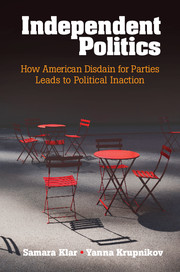Book contents
- Frontmatter
- Contents
- List of Figures
- List of Tables
- Acknowledgments
- 1 Independents in Name Only
- 2 Inside the Mind of an Independent Voter in America
- 3 How Do You Like Me Now? The Desirability of Political Independence
- 4 Everybody Hates Partisans
- 5 Partisanship and Political Participation
- 6 Undercover Partisans in America
- 7 The Myth of Partisan Compromise
- 8 The Partisan Underground in an Era of Polarization
- Appendix
- References
- Index
2 - Inside the Mind of an Independent Voter in America
Published online by Cambridge University Press: 05 January 2016
- Frontmatter
- Contents
- List of Figures
- List of Tables
- Acknowledgments
- 1 Independents in Name Only
- 2 Inside the Mind of an Independent Voter in America
- 3 How Do You Like Me Now? The Desirability of Political Independence
- 4 Everybody Hates Partisans
- 5 Partisanship and Political Participation
- 6 Undercover Partisans in America
- 7 The Myth of Partisan Compromise
- 8 The Partisan Underground in an Era of Polarization
- Appendix
- References
- Index
Summary
“I am no bird; and no net ensnares me: I am a free human being with an independent will.”
– Charlotte Brontë, author, from the novel Jane EyreEveryone wants to make a good impression. As a result, we tend to modify our behaviors – for example, by pretending to like something we actually do not like at all just for the sake of impressing the people around us. The desire to make a good impression is so pervasive that even we, the authors of this book, are not immune to it. We began this chapter with a quote from the classic novel Jane Eyre, written by Charlotte Brontë. Many people respect Brontë's work, and, deep down, we felt that opening our second chapter with a quote from Jane Eyre would lead readers to form a better impression of us. Secretly, though, the passage we really wanted to open with is from an episode of the television show Friends. Rachel – one of the characters on the show – claims that her favorite movie is Dangerous Liaisons because she does not want to admit that her favorite movie is actually Weekend at Bernie's. Much like Rachel's concern about the negative judgments associated with loving Weekend at Bernie's, we too worried that opening with a reference to Friends would leave a negative impression of us (even though we do believe that Friends makes for a better opener to this chapter than Brontë).
The problem for American political parties, as we will discuss in this chapter, is that the parties want to be respectable, like Dangerous Liaisons, but they are really more like Weekend at Bernie's – something that one might secretly support but would rather not associate with publicly. The presence of independents, we argue, goes hand-in-hand with the perception that being a partisan is not something to be proud of. As a result, people are reluctant to behave in any way that might lead others to identify them as supporters of political parties.
In this chapter, we make our way through a series of political puzzles. Previous scholarship has concluded that independents are merely undercover partisans, but we move beyond this conclusion. We consider what it is about American politics that motivates partisans not only to report that they are independent but also to avoid forms of political participation that may be perceived as partisan.
- Type
- Chapter
- Information
- Independent PoliticsHow American Disdain for Parties Leads to Political Inaction, pp. 15 - 37Publisher: Cambridge University PressPrint publication year: 2016



